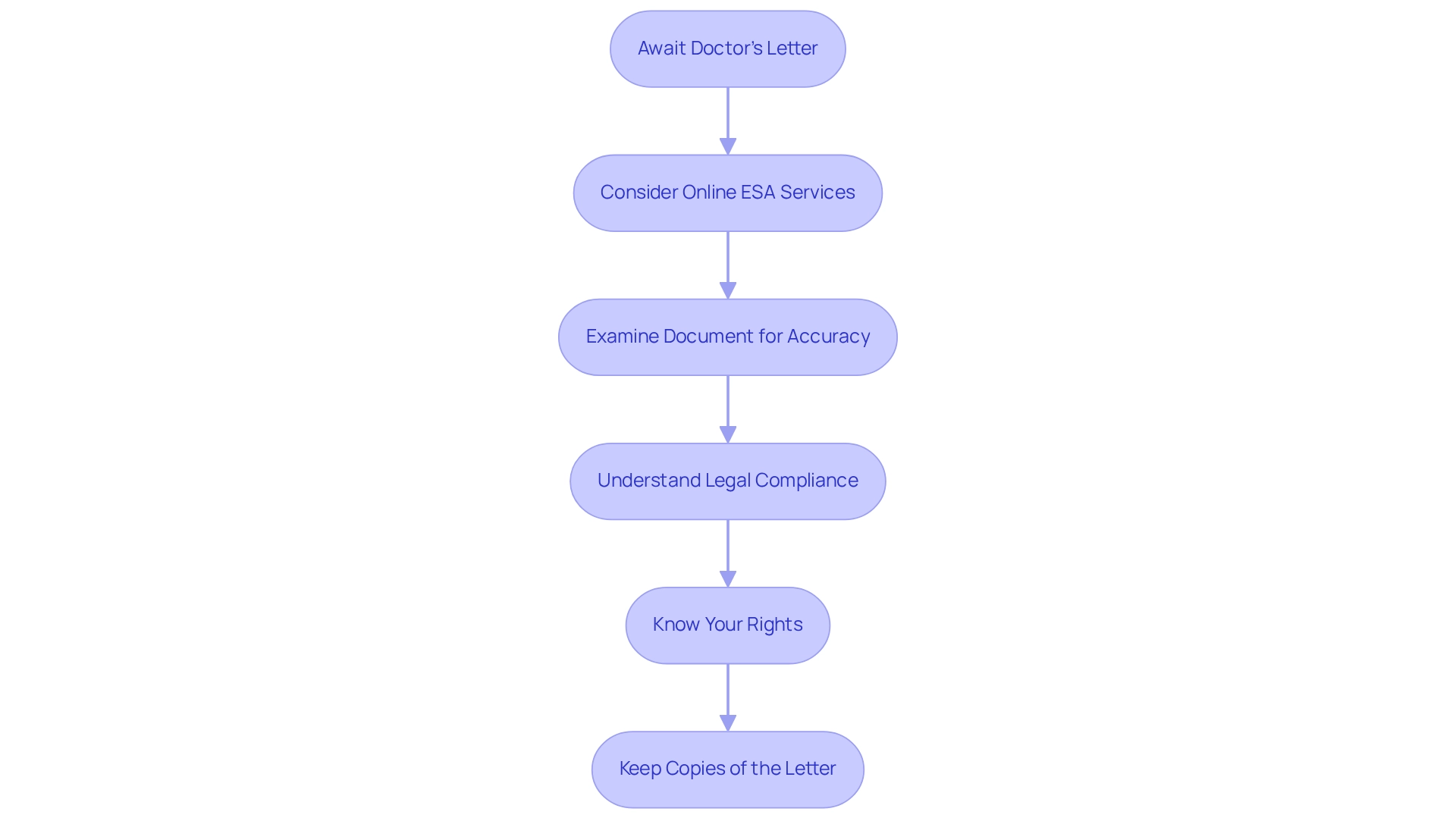

Steps to Obtain a Letter from Doctor for Emotional Support Animal
by Lena Park
Last updated: July 6, 2025
Verified and Approved by:
Angela Morris,
MSW, LCSW
Fact Checked

Overview
If you are seeking a letter from a doctor for an emotional support animal (ESA), it is essential first to recognize your mental health condition. Consulting with a licensed mental health professional can provide the support you need to assess your situation and obtain the necessary documentation. Many individuals face emotional challenges, and understanding these struggles is the first step toward healing. The process can feel overwhelming, but you are not alone.
An ESA can offer significant comfort and companionship, helping to alleviate the emotional burdens you may carry. It is important to be well-prepared and informed about your legal rights under the Fair Housing Act. Knowing these rights can empower you to navigate housing and travel effectively with your ESA.
As you embark on this journey, remember that the legitimacy of the ESA letter is crucial in ensuring you receive the support you deserve. It is a compassionate solution that can enhance your quality of life. Take a moment to reflect on how an ESA might positively impact your emotional well-being. You are worthy of the support that can help you thrive.
Introduction
Navigating the world of emotional support animals (ESAs) can feel overwhelming, especially when grappling with questions about eligibility, rights, and necessary documentation. If you are facing mental health challenges like anxiety, depression, or PTSD, the companionship of an ESA can provide significant emotional relief. However, understanding how to obtain a legitimate ESA letter is vital to ensure these animals can offer the support you need in housing and travel situations.
This guide outlines essential steps to help you determine your eligibility, consult with licensed professionals, and effectively utilize your ESA letter. It emphasizes the importance of compliance with legal protections and the need to avoid potential scams.
- Have you ever felt alone in your struggles?
- Seeking solace from a furry friend can be a powerful step toward healing.
This comprehensive resource aims to enhance your mental well-being through the support of an emotional companion, reassuring you that you are not alone on this journey.
Determine Your Eligibility for an ESA Letter
To determine your eligibility for an ESA letter, please consider these essential steps:
- Identify Your Mental Health Condition: It’s important to recognize that common conditions qualifying for an ESA letter include anxiety, depression, and PTSD, among others. Reflecting on your mental health history and any diagnoses you may have received is crucial in establishing your need for assistance.
- Assess the Impact of Your Condition: Take a moment to evaluate how your mental health condition affects your daily life. Could the companionship of an emotional assistance creature alleviate your symptoms or enhance your overall well-being? Studies show that emotional assistance creatures can significantly reduce feelings of isolation and distress, providing vital emotional comfort.
- Consult Resources: Utilize online platforms and mental health screenings to gain insights into your condition. Websites like Wellness Wag offer efficient online procedures for acquiring a letter from a doctor for an emotional support animal through their telehealth services, providing initial evaluations that can assist in defining your requirements and guiding you through the process of securing an ESA document.
- Document Your Condition: It’s beneficial to maintain thorough records of any previous diagnoses, treatments, or therapy sessions. This documentation will be vital when discussing your needs with a healthcare professional, supporting your case for requiring an emotional support animal.
- Understand the Legal Framework: Familiarize yourself with the criteria for qualifying for an ESA document. The Fair Housing Act and the Air Carrier Access Act offer protections for individuals with valid ESA documentation, ensuring access to housing and travel accommodations. Please be aware that attempting to use a fraudulent ESA document is a federal offense with severe consequences, including hefty fines. This underscores the importance of acquiring a valid ESA document through reliable services such as Wellness Wag.
- Ultimately, a licensed mental health specialist will assess your circumstances and provide you with a letter from a doctor for an emotional support animal. Their expertise is essential in ensuring that your needs are precisely evaluated and documented, paving the way for valid assistance. As Michael Newton, a PGA Golf Coach, emphasizes, “Get your legitimate ESA Letter. Free pre-screening. 100% Money back guarantee.”
By following these steps, you can effectively navigate the process of obtaining an ESA document, ensuring that you receive the emotional assistance you require. Furthermore, please be mindful of the risks associated with ESA document scams, as highlighted in the case study ‘The Dangers of ESA Document Scams,’ which cautions against rapid certifications that lack comprehensive clinical assessment. Wellness Wag’s detailed evaluations help prevent fraud and ensure authentic assistance for individuals with disabilities.
Consult with a Licensed Healthcare Professional
Consult with a Licensed Healthcare Professional
- Find a Qualified Provider: Begin your journey by identifying licensed mental health professionals (LMHPs) such as psychologists, psychiatrists, or licensed therapists. Consider utilizing directories or platforms like Wellness Wag, which specialize in ESA evaluations, to streamline your search. You can also take a quiz to assess your potential eligibility for an ESA before the formal consultation, which can help guide your next steps.
- Schedule an Appointment: Once you’ve found a provider that resonates with you, reach out to arrange a consultation. It’s important to clearly communicate your intention to discuss obtaining a letter from a doctor for your emotional support animal, ensuring they understand your needs from the outset.
- Prepare for the Consultation: As you prepare, compile relevant details about your mental health history, including any diagnoses, treatments, and how your condition impacts your daily life. Being ready to express how an emotional assistance animal could positively influence your recovery journey is essential.
- Be Honest and Open: During your consultation, maintain transparency about your mental health struggles and the specific ways you believe an ESA could assist you. This openness is crucial for the professional to make an informed assessment regarding your eligibility for a letter from a doctor for an emotional support animal. As Wellness Wag wisely advises, “You must ensure that your dog won’t cause disruptions in the office,” which is an important consideration for working professionals.
Research indicates that emotional support animals can significantly alleviate stress levels in individuals diagnosed with anxiety or depression, underscoring the importance of this process. By 2025, there will be approximately 600,000 licensed mental health professionals in the U.S., providing ample resources for those seeking ESA documentation. Moreover, testimonials from satisfied clients highlight the ease of the process with Wellness Wag, emphasizing their supportive and efficient service.
For instance, one client shared, “Wellness Wag made getting an Emotional Support Animal a breeze. The staff was very supportive and helpful throughout the process.” Consulting with a licensed healthcare professional not only facilitates access to these benefits but also ensures that the process is handled with the necessary care and professionalism.
Receive Your Official ESA Letter
Once you have received approval for your ESA document, it’s important to follow these steps to obtain your official documentation:
- First, await the letter from your doctor for your emotional support animal. After your consultation, the healthcare professional will prepare this document. Typically, this process takes between 24 to 48 hours, depending on the provider’s efficiency.
- If your main healthcare provider is unable to provide the letter promptly, consider trustworthy online ESA services as an alternative for a quicker turnaround.
- When you receive the document, take a moment to examine it closely. Ensure it includes essential details such as your name, the date, the professional’s licensing information, and a clear statement confirming your need for an ESA due to your mental health condition.
- Obtaining this letter is crucial for legal compliance and your peace of mind.
- If you feel your landlord has wrongfully denied your ESA request, remember that you may have recourse under fair housing laws.
- Additionally, please be aware that assistance animals are only permitted within your assigned residence hall and must be fully house-trained and up to date on all vaccinations.
If you notice any inaccuracies or missing information in your letter, don’t hesitate to reach out to your provider for revisions. It’s essential that your ESA letter complies with all legal standards to prevent any issues related to housing or travel. Keep copies of the finalized letter, making several duplicates. These will be invaluable for housing applications and travel arrangements, ensuring you have the necessary documentation readily available when needed.

Understand Your Rights as an ESA Owner
As an ESA owner, understanding your rights is crucial for your well-being and peace of mind.
Housing Rights: The Fair Housing Act empowers you to live with your emotional support companion, even in properties that have no-pets regulations. This means landlords cannot deny your request based on breed or size restrictions, ensuring that your ESA can accompany you in your home. However, it’s important to note that ESA owners in states like Alabama must navigate both federal protections and state limitations, as highlighted in the case study “Understanding ESA Laws in Alabama.”
Travel Rights: While airlines are no longer required to accommodate emotional support animals in the same manner as service animals, some airlines still allow ESAs. It’s essential to confirm the specific airline’s policy and provide your ESA documentation at the time of booking to facilitate your travel. Recent changes in airline policies regarding ESAs should be noted, as they can significantly impact your travel experience.
No Additional Fees: Under the Fair Housing Act, landlords cannot impose pet fees or deposits for your ESA. However, you may be held responsible for any damages caused by your pet, so it’s wise to ensure your ESA is well-behaved and comfortable in various environments.
Documentation: Always keep your letter from your doctor for your emotional support animal accessible, as you may need to present it to landlords or airline staff to confirm your need for the creature. This documentation is vital in advocating for your rights and ensuring compliance with housing and travel regulations.
Understanding the legal rights of service dog owners can also provide valuable context for ESA owners. Service dog owners enjoy full public access rights as protected by the Americans with Disabilities Act (ADA), allowing them to bring their service dogs into public spaces, including restaurants and stores. While ESAs do not have the same level of access, knowing these distinctions can empower ESA owners to advocate for their rights more effectively.
It is vital to respect the working status of service dogs and avoid distracting or petting them without permission from their handlers, as this can interfere with their tasks and compromise the safety and well-being of the handler. By being informed and prepared, ESA owners can better advocate for their rights and ensure their emotional support animals are recognized and accommodated. Remember, you are not alone in this journey; support is available to help you navigate these challenges.
Utilize Your ESA Letter for Housing and Travel
To effectively utilize your ESA document, follow these steps with care and consideration:
- First, inform your landlord by presenting the letter from your doctor for your emotional support animal, along with your documentation when applying for housing. It’s essential to clearly articulate your rights under the Fair Housing Act, which protects individuals with emotional or mental disabilities by allowing them to live with their emotional support animals. This is possible even in pet-restricted accommodations, provided you have the necessary letter from your doctor.
- If your landlord enforces a no-pets policy, it’s important to formally request a reasonable accommodation for your ESA. Include any necessary documentation, specifically your doctor’s letter, to substantiate your request. Many individuals have successfully navigated housing applications using this approach, highlighting its effectiveness.
- When making travel arrangements, inform the airline of your ESA status and present your documentation. Each airline has specific requirements for traveling with an ESA, so reviewing these in advance is crucial. Notably, Air Canada no longer acknowledges emotional support pets but allows psychiatric service dogs to travel with appropriate documentation. Be sure to complete a U.S. DOT form and notify the Medical Assistance Desk at least 48 hours before your flight. A PSD document is recommended for a smoother check-in experience. Recent submissions from ESA travelers underscore the vital role emotional support animals play in supporting mental health during travel, reinforcing the need for clear guidelines and documentation. Community feedback has bolstered regulations requiring transportation service providers to accommodate ESAs, recognizing their potential to enhance mental health and social interaction.
- Be prepared for questions from landlords or airline staff regarding your ESA. Reflect on how your pet assists you and the mental health benefits it provides. This preparation can help facilitate a smoother interaction and reinforce your rights. Given the limitations on the types of public venues a general pet may access, individuals living with emotional or mental disabilities might consider acquiring an ESA dog, which is entitled to specific housing and travel rights upon obtaining a letter from their doctor.
- In light of the rising number of individuals acquiring fake ESA letters, it is vital to ensure that your documentation is legitimate and compliant with legal standards. By following these steps, you can confidently advocate for your rights and ensure that your emotional support animal can accompany you in housing and travel situations, providing the companionship and support you deserve.
Conclusion
Navigating the process of obtaining an emotional support animal (ESA) letter is a crucial step for those seeking the companionship and relief these animals can provide. It begins with recognizing the emotional challenges that come with mental health conditions, understanding how they affect daily life, and consulting with licensed professionals. This foundational step not only ensures that individuals can secure legitimate ESA letters but also helps them feel validated in their experiences, complying with legal protections such as the Fair Housing Act.
Once eligibility is established, the next phase involves receiving the official ESA letter. This document must be accurate and comprehensive, serving as proof of the need for an emotional support animal in both housing and travel contexts. Knowing one’s rights as an ESA owner is equally important; it empowers individuals to advocate for themselves in housing situations and while traveling, allowing them to embrace the benefits of their emotional support animal without facing unnecessary barriers.
Ultimately, the journey toward acquiring and utilizing an ESA is about enhancing mental well-being and fostering a supportive environment. By following the outlined steps and staying informed about their rights and responsibilities, individuals can confidently navigate the complexities of ESA ownership. The companionship of an emotional support animal can be a powerful ally in the journey toward healing, reinforcing the message that no one has to face their struggles alone. Remember, you are not alone in this journey; there is support available to help you thrive.
Frequently Asked Questions
What are the common mental health conditions that qualify for an ESA letter?
Common conditions include anxiety, depression, and PTSD, among others.
How can I assess the impact of my mental health condition?
Evaluate how your condition affects your daily life and consider whether the companionship of an emotional support animal could alleviate your symptoms or enhance your overall well-being.
What resources can I use to help determine my eligibility for an ESA letter?
Utilize online platforms and mental health screenings, such as Wellness Wag, which offers telehealth services for acquiring an ESA letter.
Why is it important to document my mental health condition?
Maintaining thorough records of previous diagnoses, treatments, or therapy sessions is vital for discussing your needs with a healthcare professional and supporting your case for an emotional support animal.
What legal protections do I have with a valid ESA document?
The Fair Housing Act and the Air Carrier Access Act offer protections, ensuring access to housing and travel accommodations for individuals with valid ESA documentation.
What are the consequences of using a fraudulent ESA document?
Attempting to use a fraudulent ESA document is a federal offense that can lead to severe consequences, including hefty fines.
Who will ultimately assess my need for an ESA letter?
A licensed mental health specialist will evaluate your circumstances and provide you with a letter from a doctor for an emotional support animal.
How should I prepare for a consultation with a licensed healthcare professional?
Compile relevant details about your mental health history, including diagnoses and treatments, and be ready to express how an emotional assistance animal could positively influence your recovery.
What should I be honest about during my consultation?
You should maintain transparency about your mental health struggles and the specific ways you believe an ESA could assist you.
How can I find a qualified provider for an ESA evaluation?
You can identify licensed mental health professionals through directories or platforms like Wellness Wag, which specialize in ESA evaluations.
Certify Your Emotional Support Animal Today

Why You Can Rely on Us?
At Wellness Wag, we believe your pet deserves care rooted in both science and compassion. Each article is carefully researched, written in clear language for pet owners, and then reviewed by qualified professionals to ensure the information is evidence-based, current, and practical for real-life care. Our goal is to help you feel confident in making informed decisions about your pet’s health and well-being.
Reviewed by
Angela Morris, MSW, LCSW
Angela is a licensed clinical social worker with 20 years of experience in patient advocacy and community mental health. She has assisted numerous clients with ESA evaluations and brings a deep understanding of disability accommodations, ensuring that all information is accurate, supportive, and practical.

Written by :
Lena Park
Last Updated :
July 6, 2025












